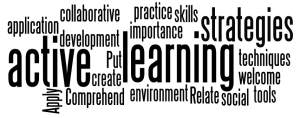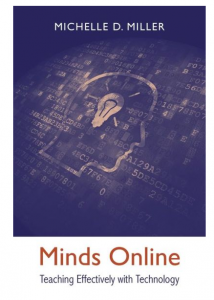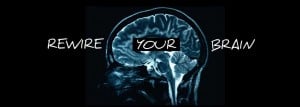 Monday, I attended a regional conference hosted by the Harvard University Derek Bok Center for Teaching and Learning on active learning. It was a good day of conversation with colleagues from some 35 institutions in the area. I met Jim Lang of Assumption College, and he pointed out that “active learning” is a potential active learning problem for faculty in general. Totally agree.
Monday, I attended a regional conference hosted by the Harvard University Derek Bok Center for Teaching and Learning on active learning. It was a good day of conversation with colleagues from some 35 institutions in the area. I met Jim Lang of Assumption College, and he pointed out that “active learning” is a potential active learning problem for faculty in general. Totally agree.
During the morning, we worked as small groups to identify both barriers to adoption and solutions:
Some barriers:
- Faculty personal identity as “one who lectures”
- Loss of control
- Fear that experimentation will impact student evaluations
- Classroom spaces not conducive to active learning
- Lack of faculty knowledge as to active learning techniques
Some solutions:
- Creating culture of active learning
- Sharing of practices … and sharing evidence of efficacy
- Spotlights on faculty doing it
- Discipline journals including SoTL in addition to discipline research
- Convene faculty development around shared problems
- Start with small teaching activities
- Understand the difference between “starting” versus “sustaining” active learning
 Yet, my best take-away from the conference came when Jim mentioned a new book he was reading on the train that morning: Michelle Miller’s (2014) Minds Online: Teaching Effectively With Technology. I immediately went online and ordered my own copy, which arrived last night. The book starts with the cognitive principles that could be applied to improved learning through technology, focusing on attention, memory and thinking. It then provides practical applications of these principles to provide a “cognitively optimized, fully online course.” That intrigued me! Sixty-five pages in, I am excited enough to post this preliminary reaction.
Yet, my best take-away from the conference came when Jim mentioned a new book he was reading on the train that morning: Michelle Miller’s (2014) Minds Online: Teaching Effectively With Technology. I immediately went online and ordered my own copy, which arrived last night. The book starts with the cognitive principles that could be applied to improved learning through technology, focusing on attention, memory and thinking. It then provides practical applications of these principles to provide a “cognitively optimized, fully online course.” That intrigued me! Sixty-five pages in, I am excited enough to post this preliminary reaction.
Michelle noted in the preface that this book “…explains how principles of human cognition can inform the effective use of technology in college teaching”, noting:
- “Technology enables frequent, low-stakes testing, an activity that powerfully promotes memory for material
- Technology encourages better spacing of study over the time course of the class and helps prevent cramming.
- Technology facilitates presentation of material in ways that take advantage of learners’ existing knowledge about a topic.
- Technology facilitates presentation of material via multiple sensory modalities, which, if done in the right ways, can promote comprehension and memory.
- Technology offers new methods for capturing and holding students’ attention, which is a necessary precursor for memory.
- Technology supports frequent, varied practice that is a necessary precursor to the development of expertise.
- Technology offers new avenues to connect students socially and fire them up emotionally.
- Technology allows us to borrow from the techniques of gaming to promote practice, engagement, and motivation.” (p. xii)
She noted that technology does not promote learning by its mere presence … learning requires focused attention, effortful practice, and motivation (concepts that align with Susan Ambrose’s (2012) How Learning Works).
Michelle’s first chapter deals with whether online learning is here to stay. She suggests factors such as economics, student demand, calls for measurable evidence of learning, new technologies and a drive to innovate as reasons why technology in higher education is now a given … and that we should invest in using it well. She then looks at whether learning online works (noting that just by asking the question, we are holding technologically aided teaching to a higher standard than classroom teaching). She charts out principles for optimal college teaching excerpted from four “best practice frameworks:
- Chickering and Gamson’s Seven Principles for Good Practice in Undergraduate Education
- Susan Ambrose et al How Learning Works: Seven Research-Based Principles for Smart Teaching
- Judith Boettcher’s Ten Best Practices for Teaching Online: Quick Guide for New Faculty
- American Distance Education Consortium Distance Teaching Principles
These best practices do suggest that online learning works…and some of what makes it work is active learning.
In Chapter 3, she tackles some of the prevailing myths about the psychology of computing:
- Use of the web “rewires” the brain
- Students today are “digital natives”
- Social networking destroys real-life social relationships
While there are grains of truth, she provides some interesting analysis of the realities behind these myths and what that might mean for teaching.
So … I am through the first three chapters and stoked! I will continue this as I move further through the book, and I will continue to find connections with the active learning session I attended this week.
If you are looking for a good book that applies the learning sciences to online teaching, I would recommend this book.
(…and thanks again to Jim Lang for the suggestion…)
{Graphics: Kenny, Barnes and Noble, Vogler}

Thanks so much for the great feedback and your synthesis – I think you are spot on! It was my biggest hope that Minds Online would offer a thought provoking and useful framework for professionals on the front lines of new approaches to learning. Let me know if you have any questions or comments – looking forward to reading more of what you have to say!